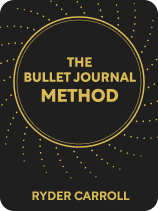

This article is an excerpt from the Shortform book guide to "The Bullet Journal Method" by Ryder Carroll. Shortform has the world's best summaries and analyses of books you should be reading.
Like this article? Sign up for a free trial here .
What are the benefits of bullet journaling? How can keeping a bullet journal help make your life easier?
In his book The Bullet Journal Method, Ryder Carroll says that bullet journaling goes beyond scheduling and making checklists. According to Carroll, bullet journaling can improve your life in three major ways: it can help you get organized, live more in the present, and find clarity.
Here’s why you should start bullet journaling.
Bullet Journaling Benefits
According to Ryder Carroll, you can boost productivity by using the Bullet Journal Method, an organizational tool that helps you be intentional about how you spend your time and energy. It’s a system that archives your life—past, present, and future—tracking not only the day-to-day details but also your choices, your actions, and how you’ve changed over time.
Carroll claims that there are three major benefits of bullet journaling: getting organized, living in the present moment, and finding clarity on what’s important to you. Let’s discuss each of these in more detail.
1. Get Organized
According to Carroll, one of the main benefits of the Bullet Journal Method is that it can help you get organized, therefore eliminating the overwhelm that’s hurting your productivity. This is especially useful because, as mentioned earlier, there are so many possibilities vying for our attention that we simply don’t have the mental capacity to keep track of everything. In an attempt to manage it all, we resort to multitasking, which often results in spreading our notes, ideas, and reminders across any number of phone apps, sticky notes, dry-erase boards, and notebooks.
(Shortform note: Aside from overwhelm, there are other potential consequences of disorganization and clutter that Carroll doesn’t mention. According to psychologists, both physical and mental clutter can significantly hinder your ability to function. Specifically, you may suffer decreased subjective well-being, poorer eating habits and mental health, and less efficient thinking and visual processing.)
Fortunately, Carroll says, the Bullet Journal Method solves this problem by providing a single outlet to declutter your mind—and your desk. Additionally, because the method utilizes a notebook, it offers flexibility that technology can’t. Whereas tech tools either have an excess of features or narrow functionality, a notebook is customizable to your specific organizational needs.
(Shortform note: The excess of features in tech tools that Carroll refers to is a common phenomenon in product design called “feature creep” or “scope creep.” In an effort to create the best product and please the widest audience, designers sometimes unintentionally overcomplicate a product by adding too many features. Fortunately, just as Carroll describes, feature creep isn’t a problem in Bullet Journaling, as only you are in charge of the journal’s design and use.)
2. Live in the Present
Another primary benefit of the Bullet Journal Method, according to Carroll, is that it encourages you to slow down and focus on the present moment. This is important because our endless distractions and urgency to keep busy make us feel like life is passing us by. We’ve become so consumed by our day-to-day lives that we’re now largely unaware of our surroundings.
(Shortform note: Research seems to support Carroll’s claim that we’re prone to living with little awareness of the present moment. One study, for example, showed that 96% of people in the UK admitted to making decisions on autopilot. What’s more, 39% say that the place where they’re most likely to slip into autopilot is at home, which is ideally where we engage the most with our lives and the people we love.)
So how can the Bullet Journal Method help you slow down? Carroll says it’s by requiring you to write by hand. Because handwriting is less efficient than typing or dictating, it forces you to pay closer attention to what you’re writing and therefore changes the way you engage with what you’re writing about, whether that’s your thoughts or the world around you.
(Shortform note: Handwriting doesn’t just change your engagement with what you’re writing—it increases it. According to research, the act of writing by hand activates more complex neural connections than typing. Furthermore, researchers say that the precise movements involved in writing by hand benefit the brain’s learning processes.)
Carroll argues that by focusing on the here and now, you can build not only stronger self-awareness but also awareness of what’s going on around you, which helps you increase your productivity.
(Shortform: Increased productivity isn’t the only positive outcome of building stronger self-awareness. Psychologists point to a variety of additional benefits of this practice, including increased empathetic responses, self-regulation, creative achievement, self-esteem, and ability to handle failure.)
3. Find Clarity
According to Carroll, a final fundamental benefit of the Bullet Journal Method is that it helps you reflect on your life and get clear on what’s important to you. He argues that this is crucial because our state of perpetual busyness creates distance between our actions and beliefs. We lose sight of why we’re doing what we’re doing, essentially running on autopilot.
(Shortform note: While he observes that perpetual busyness can indicate that you’re living on autopilot, Carroll doesn’t acknowledge how hard this autopilot mode can be to recognize or point to signs of autopilot you should look for. According to psychologists, you may be living on autopilot if you have a predictable routine, tend to worry about pleasing others, feel like you constantly lose track of time, and believe you’re missing out on meaningful experiences.)
With the Bullet Journal Method, however, Carroll says you can form a regular habit of introspection by tracking your experiences and actions over time. This record gives you opportunities to reflect and clarify what matters to you—for example, the tasks you find most fulfilling. And once you’ve found that clarity, the method can aid you in setting and working toward meaningful goals that can help you become more productive than ever before.
(Shortform note: While introspection can be beneficial, it has some potential pitfalls. Psychologists say that if you don’t practice introspection in the right way, it can negatively impact your mental health. Specifically, if introspection becomes an obsessive habit, it can cause stress, anxiety, and depression.)
Additional Benefits of Bullet Journaling
In addition to the advantages already mentioned, Carroll explains that the analog nature of the Bullet Journal Method provides further benefits that other tools and methods can’t offer. For example, because notebooks are 100% customizable, they foster creativity and inspiration, which are easy to lose sight of when you’re burnt out by demands on your time. The promise of a fresh page each day reminds you that life is full of possibility—every day is a blank slate, and it’s up to you to make something of it.
(Shortform note: Why is fostering creativity important? Research shows that creativity benefits us in different ways. For example, one study suggests that engaging in just one creative activity a day, such as playing music or drawing, boosts positivity. There are indirect benefits of creativity too—a 2010 survey of more than 1,500 CEOs from 60 countries and 33 industries found that executives value creativity more than any other business skill.)

———End of Preview———
Like what you just read? Read the rest of the world's best book summary and analysis of Ryder Carroll's "The Bullet Journal Method" at Shortform .
Here's what you'll find in our full The Bullet Journal Method summary :
- A comprehensive guide to using the Bullet Journal Method
- How to maintain a journaling practice that can improve your overall quality of life
- How to extend the method beyond productivity to a practice in mindfulness






